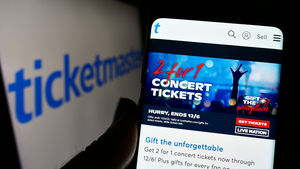Can Ticketmaster force aggrieved ticket buyers to take their complaints through arbitration, rather than resolving them in the US courts? A dispute that centers on that question has now reached the US Ninth Circuit Appeals Court.
The actual lawsuit that prompted this dispute relates to allegations of anti-competitive conduct made against Live Nation and its Ticketmaster business. However, Ticketmaster's terms and conditions say that customers must take grievances to private arbitration rather than a court of law, and the ticketing firm has successfully enforced the arbitration term in the past to keep disputes out of the public eye.
Arbitration is favoured by many companies as a way to resolve disputes because, in theory, it is more efficient and cost effective than fighting a legal battle in court. However, arbitration hearings are also private, unlike court hearings which are a matter of public record. So for many companies, keeping claims out of the courts and out of the public eye, is another highly desirable benefit of arbitration.
For Ticketmaster and Live Nation - given the media and political interest in the dominance of Live Nation in the US live entertainment market, and the calls from some quarters that the 2010 merger of Live Nation and Ticketmaster should be reversed - there are obvious benefits to keeping disputes out of the public eye. Particularly if they relate to allegations that the company has violated competition or antitrust laws.
That’s not to say that Ticketmaster has only enforced the arbitration clause in those sorts of cases and there have been various lawsuits where the ticketing firm has successfully argued that a dispute should be heard by a private arbitrator rather than a court of law.
However, in this case that argument was unsuccessful. And all because Ticketmaster “unilaterally” amended its terms around arbitration and changed the company that would handle the arbitration process, from Judicial Arbitration And Mediation Services Inc - or JAMS - to New Era.
In last year's district cout ruling, judge George H Wu said that the change in arbitrator resulted in an "unfair surprise" for the ticket-buyers and made forcing arbitration "procedurally unconscionable”.
But, says Live Nation in a filing with the appeals court, "the district court’s refusal to send this case to arbitration is inexplicable given the parties’ clear intent ... nothing about the mere change in arbitration providers here was unfair, unexpected, or otherwise unconscionable".
The plaintiffs in the case have also criticised the approach taken by the new arbitrator. JAMS “successfully resolves business and legal disputes by providing efficient, cost-effective and impartial ways of overcoming barriers at any stage of conflict”, says the company’s website. Meanwhile, New Era boasts that they “eliminate litigation gamesmanship”, offering “fair, efficient, pragmatic, flat fee 100-day arbitrations and mediations”.
The way New Era works, the plaintiffs in the case argued in the lower court, relies on “non-traditional” processes which they described as “Kafkaesque”. The change in arbitrators, therefore, they alleged, was an attempt by Ticketmaster to make it harder for customers to pursue a claim.
"Indeed that was the point", the plaintiffs state in their own submission to the Ninth Circuit, "to bind the antitrust class to New Era’s Rules, hoping to defeat the upcoming mass arbitration. Faced with these facts, the district court properly concluded that Live Nation’s terms were unconscionable under California law".
Live Nation’s appeal was filed with the Ninth Circuit last November, though its filing was only made public last week. The ticket buyer plaintiffs have now filed their response, and we await to see what the Ninth Circuit judges make of the whole thing.

